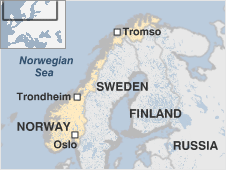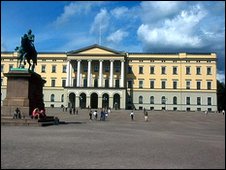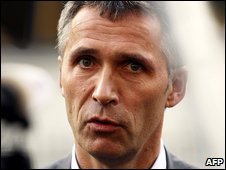 |
Europe's northernmost country the Kingdom of Norway is famed for its mountains and spectacular fjord coastline as well as its history as a seafaring power.
It also enjoys one of the highest standards of living in the world in large part due to the discovery in the late 1960s of offshore oil and gas deposits.
Overview
Norway's annual oil revenue amounts to around $40bn (£21bn) and more than half of its exports come from this sector. To counter inflation there is cross-party agreement to restrict spending of oil revenue. The very considerable surplus is invested for future generations.

Royal palace Oslo: The monarch has little legislative power
|
Norway declared its independence in 1905 when the union with Sweden was dissolved. Norway's people value their independence and prosperity highly. The Norwegians rejected membership of the then European Economic Community in 1972 and of the European Union in 1994 despite being urged by their governments to vote "yes".
In recent decades Norway has forged a stronger role for itself in international politics. It has mediated between Israel and the Palestine Liberation Organisation and from 2000 to 2009 was the chief mediator in the conflict between the Sri Lankan government and Tamil separatists.
Norway has a rich sea-faring tradition and its lengthy rugged coastline has been central to its development. More than a thousand years ago Viking raids on the coasts of Britain and France were commonplace. The Vikings also mounted expeditions to the coast of North America.
Later the Norwegians began to trade. Originally the coastal waters provided fish for export. Today Norway is among the world's largest exporters of fuels and fuel products.
Norway registered objections to the 1986 International Whaling Commission (IWC) ban on whaling and resumed the practice on a commercial basis in 1993. It argues that whaling is no more cruel than fishing and that stocks are sufficient to allow it to continue. Conservationists disagree.
Facts
- Full name: Kingdom of Norway
- Population: 4.8 million (UN 2009)
- Capital: Oslo
- Area: 323759 sq km (125004 sq miles)
- Major language: Norwegian
- Major religion: Christianity
- Life expectancy: 78 years (men) 83 years (women) (UN)
- Monetary unit: 1 Norwegian krone = 100 ore
- Main exports: Fuels and fuel products machinery metal products
- GNI per capita: US $87070 (World Bank 2008)
- Internet domain: .no
- International dialling code: +47
Leaders
King: Harald V
Prime minister: Jens Stoltenberg

Mr Stoltenberg's government has used state spending as a tool to stimulate growth
|
Labour Party leader Jens Stoltenberg took office as prime minister in a centre-left "red-green" alliance with the Socialist and Centre parties in
October 2005 following elections the previous month which brought defeat
for the former centre-right government.
His coalition narrowly retained its majority in the 2009 election becoming the first Norwegian government to win a second consecutive term in 16 years.
Mr Stoltenberg promised increased spending on education health and welfare and reversed the tax cuts proposed by the previous administration. He vowed that the budget policy would abide by Norway's strict rules on spending oil revenues.
He also gave his backing to limited oil exploration in the Arctic.
His government withdrew Norway's very small contingent of troops from Iraq but promised to increase the country's profile in UN peacekeeping operations elsewhere.
Mr Stoltenberg an economist was 46 when he took office. He was prime minister for the first time from 2000 until 2001.
Media
Norway's public broadcaster NRK monopolised the airwaves until 1981 when the first local radio and TV stations opened. Since then private local and national stations have built up substantial audiences competing with NRK for listeners and viewers.
The country's Schibsted group publisher of the Aftenposten daily and the mass-circulation VG is one of Scandinavia's largest media concerns.
Digital television via cable and satellite offers a wide range of specialist channels. Digital terrestrial TV is set to replace analogue networks by the end of 2009.
Norwegians are among the world's keenest newspaper readers. The number of publications is impressive given the country's small population. Most of the press is privately-owned and openly partisan.
Press freedom is guaranteed by the constitution and public radio and TV broadcast without interference from the government.
The press
- VG - large-circulation national daily
- The Norway Post - English-language
- Aftenposten - daily
- Dagbladet - mass-circulation national daily
- Morgenbladet - weekly
Television
- NRK - public broadcaster operates national channels NRK-1 and NRK-2
- TV2 - national commercial; NRK's main competitor
- TV3 Norge - commercial via satellite
- TV Norge - commercial via satellite and terrestrially
Radio
- NRK - public broadcaster operates three national stations and local services
- P4 - national commercial
- Radio Norge - national commercial music
-
Radio 1 - commercial music
AFRICA | ASIA-PACIFIC | AMERICAS | EUROPE | MIDDLEEAST | SOUTHASIA
Mauritania Mauritius Morocco Mozambique Namibia Niger Nigeria Republic-of-congo Rwanda Sao-tome-and-principe Senegal Seychelles Sierra-leone Somalia South-africa Sudan Swaziland Tanzania The-gambia Togo Tunisia Uganda zambia Zimbabwe Australia Brunei Burma Cambodia China East-timor Fiji Indonesia Japan Kazakhstan Kiribati Kyrgyzstan Laos Malaysia Marshall-islands Micronesia Mongolia Nauru New-zealand North-korea Palau Papua-new-guinea Samoa Singapore Solomon-islands South-korea Taiwan Tajikistan Thailand The-philippines Tonga Turkmenistan Tuvalu Uzbekistan Vanuatu Vietnam Antigua-and-barbuda Argentina Bahamas Barbados Belize Bolivia Brazil Canada Chile Colombia Costa-rica Cuba Dominica Dominican-republic Ecuador El-salvador Grenada Guatemala GuyanaHaiti Honduras Jamaica Mexico Nicaragua Panama Paraguay Peru St-kitts-and-nevis St-lucia St-vincent-and-the-grenadines Suriname Trinidad-and-tobago United-states-of-america Uruguay Venezuela Albania Andorra Armenia Austria Azerbaijan Belarus Belgium Bosnia-hercegovina Bulgaria Croatia Cyprus Czech-republic Denmark Estonia Finland France Georgia Germany Greece Hungary Iceland Ireland Italy Latvia Liechtenstein Lithuania Luxembourg Macedonia Malta Moldova Monaco Montenegro Norway Poland Portugal Russia San-marino Serbia Slovakia Slovenia Spain Sweden Switzerland The-netherlands Turkey Ukraine United-kingdom Vatican Algeria Egypt Iran Iraq Israel-and-palestinian-territories Jordan Kuwait Lebanon Libya Mauritania Oman Saudi-arabia Sudan Syria Tunisia United-arab-emirates Yemen Afghanistan Bangladesh Bhutan India Nepal Pakistan Sri-Lanka The-Maldives

